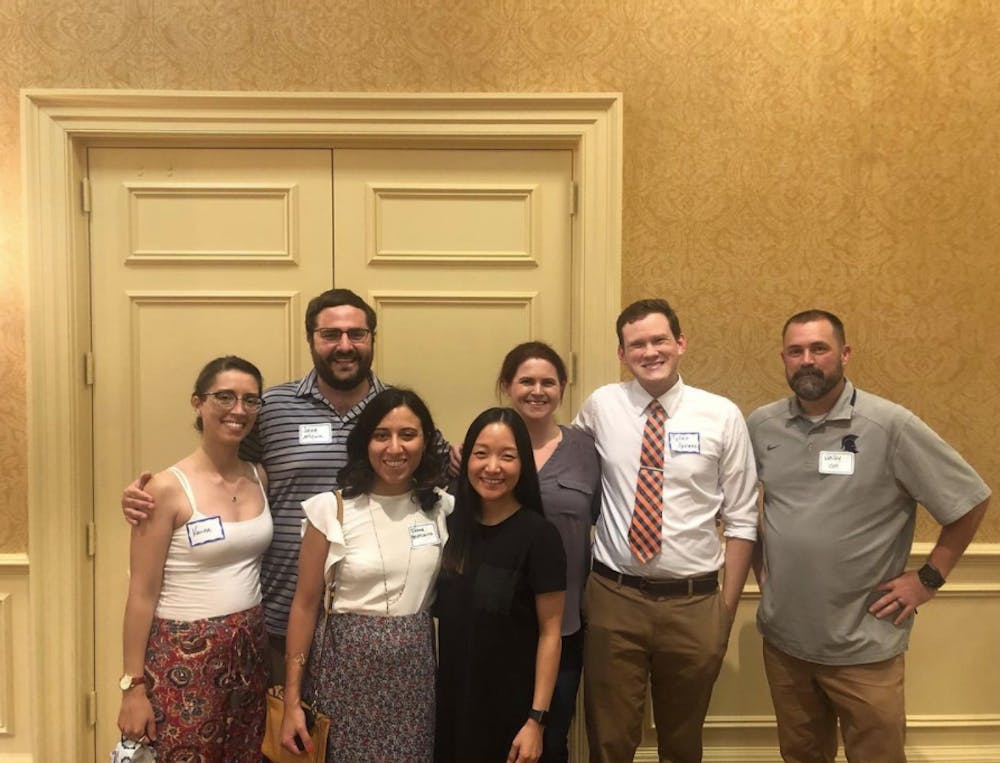Lea en español
For first-generation graduate students — those whose parents did not complete a four-year higher-education degree — higher-education spaces can bring struggles, including financial insecurity, pressure to graduate early and trouble navigating the job market. The First Generation Graduate Student Coalition, established last spring, aims to combat these challenges and is working as the first on-Grounds organization aimed at supporting these students at the University.
The FGSC was founded by a group of graduate students from schools across the University last year and currently consists of over 250 first-generation graduate students. The coalition empowers its members through hosting community building events and professional development seminars and brings public awareness to these students through social media and newsletters.
Education graduate student Jesse McCain and Darden student Ivana Brancaccio are co-presidents of the coalition. McCain, who was raised by two-working class parents, said he first noticed the need for the FGSC two years ago when he started as a doctoral candidate in the Education school.
“When I started my PhD I noticed there were many initiatives to support first-gen undergraduate students, but graduate students were sort of not mentioned,” McCain said. “As a first-gen student myself, I knew this identity meant a lot to me, and that it brought with it some particular challenges even at the graduate level.”
Organizations like First-Generation/Low Income Partnership and HoosFirst, McCain noted, exist to support undergraduate first-generation students by building community among and advocating for first-generation and low income undergraduates. Student Council also released a Guide to Being Not-Rich at U.Va. in November that provides resources for low-income and first-generation students at the University including financial and academic information, mentorship opportunities and study abroad tips.
Before the establishment of the FGSC, no on-Grounds organizations were specifically aimed at supporting graduate students in similar positions.
Brancaccio said her father’s family and her mother immigrated from Italy, both have high school educations and worked hard to send Brancaccio and her brother to college. In high school, Brancaccio said she felt challenged when studying for and taking the SAT, while her peers’ parents who attended college had a better grasp of the test’s importance.
When Brancaccio and McCain met, they realized that first-generation graduate students face similar challenges.
“You know, we come from a very similar background … and so it was just really interesting to kind of see a lot of the difficulties and struggles, you know, kind of come out,” Brancaccio said. “Feeling imposter syndrome, lack of resources going to school [and] not really knowing how to navigate.”
As students begin to pursue their graduate studies, Brancaccio said these feelings and struggles, which are initially experienced when first applying to undergraduate programs, resurface.
Last year, McCain distributed a survey to first-generation graduate students at the University that garnered 229 responses, with the assistance of his mentor, Education and Sociology Prof. Josipa Roksa. 58 percent of the respondents, or 133 participants, said their parents had a high school education or less, while the remaining 42 percent of respondents’ parents had some college or an associates degree.
In fall 2020, 502 out of 8,328 graduate students at the University were reported to be first-generation, although data was not available for 4,737 students.
Being first-generation in graduate school, like in undergraduate, similarly places students at a disadvantage compared to their peers who have parents who completed graduate degrees. University faculty are 25 times more likely than the general population to have at least one parent with a graduate degree, indicating the importance of family background in academia even at the graduate level of education.
Nearly all respondents said they would be interested in professional workshops, mentoring undergraduates and workshops on topics such as imposter syndrome — which occurs when people feel like a fraud and doubt their own abilities.
To meet students’ hopes for the coalition, the FGSC developed three pillars — community building, professional development and visibility.
To build community, Brancaccio said the coalition plans to put on social events, host lunches with first-generation graduate faculty members, create a forum to build confidence among students and mentor first-generation undergraduates at the University. For professional development, the coalition will hold networking events and make students aware of scholarship and fellowship opportunities. The coalition will bring visibility to the presence of first-generation graduate students through their social media, newsletters and strategic events.
McCain encourages undergraduate students, especially those involved in first-generation organizations, to spread the word about the coalition and “generate energy.”
“Tell grad students you know about it, tell your friends about it, you know, help us be part of this journey,” McCain said.
Brancaccio agreed with McCain, emphasizing that undergraduate first-generation undergraduate students may one day be in the same position as the current graduate first-generation students.
There are certain institutional differences that distinguish the undergraduate experience from the graduate experience — while undergraduate classes are large and there is greater flexibility in selecting courses, graduate classes are small and have concentrated coursework. FGSC hopes to ease that transition to higher-level schooling.
“Ultimately these undergrads are one day, like if they want to continue their education, they're going to be in our shoes,” Brancaccio said. “We want to be able to help, you know, create an experience where they can easily transition from undergrad education to a graduate education.”
The coalition can be reached on Instagram at @firstgengradsuva.







